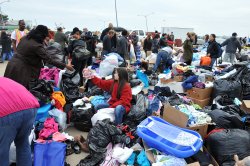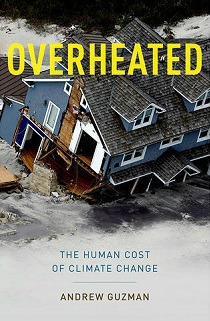
Anton Oparin / ShutterstockVictims of Hurricane Sandy receive aid in Queens. Expect more scenes like this in the future.
Ask Andrew Guzman, a professor of international law at U.C. Berkeley, why he decided to write a book about climate change, and he says it’s simple: It’s the biggest issue of our time.
“If I didn’t write about it,” he says, “for my grandkids, I’d sound like somebody who wasn’t interested in Nazi Germany in 1939.”
Guzman doesn’t want to be painted as an alarmist. That’s why, for the book, Overheated: The Human Cost of Climate Change, he assumes that we will see a modest (and increasingly optimistic) 2 degrees C of warming. You know, so as to stay on the conservative side of things.
But it turns out that 2 degrees is enough to sound some serious fucking alarm bells.
Guzman’s main goal, he says, was to look at the social, economic, and political costs of global warming. Most books focus on physical and environmental changes. Guzman wanted to examine human consequences.
Guzman spends a significant portion of Overheated exploring how troubled parts of the world will be affected by food and water scarcity vis-à-vis climate change. But some of the scarier parts of the book are about the overabundance of water that’s coming our way: 2 degrees warming probably equates to about a one-meter rise in sea level this century. That’s enough to displace hundreds of thousands to millions of people in low-lying nations, and, as of now, there is no plan to deal with environmental refugees.
“I think the question is whether the exit will be orderly or emergency crisis,” Guzman says. “If a storm comes at the wrong time and the international community is then plucking these people out of the sea, it’ll be horrible.”
The environmental-refugee problem becomes eye-poppingly scary when you look at the 150 million people living in Bangladesh. A one-meter sea level rise would swamp about 17 percent of the country.
“We know where people go when they lose their land: They go to cities, and they go to refugee camps,” Guzman says. “So the Bangladeshi cities that remain are going to be overrun and crumbling. Just think of the sewage system alone.”
Lest you think no one has considered what might happen next, in recent years India has increased security along the border with Bangladesh. “But fences are only so good up to a point,” Guzman says. “So how much violence are you prepared to use to keep that border secure? It’s not at all clear to me that the border can remain intact.”
 Global warming is often couched as an environmental problem, but for Guzman, this misses the point. He’s skeptical that drowning polar bears and acidified coral reefs will mobilize the public into action. He’s a realist appealing to self-interested Americans. This isn’t about hugging trees and saving whales. This is about international security, global pandemics, terrorism — and a moral imperative.
Global warming is often couched as an environmental problem, but for Guzman, this misses the point. He’s skeptical that drowning polar bears and acidified coral reefs will mobilize the public into action. He’s a realist appealing to self-interested Americans. This isn’t about hugging trees and saving whales. This is about international security, global pandemics, terrorism — and a moral imperative.
Overheated is a fascinating read in part because Guzman goes out of his way not to be hyperbolic. But if you buy his book as you’re boarding a plane, it’s more likely than not that you’ll land feeling alarmed.
Listen in as I talk to Guzman about how he got involved with this topic, the chances that we’ll be able to avert disaster — and what we’re in for, as a species, if we fail to react in time.
This interview is part of the Generation Anthropocene project, in which Stanford students partake in an inter-generational dialogue with scholars about living in an age when humans have become a major force shaping our world.




